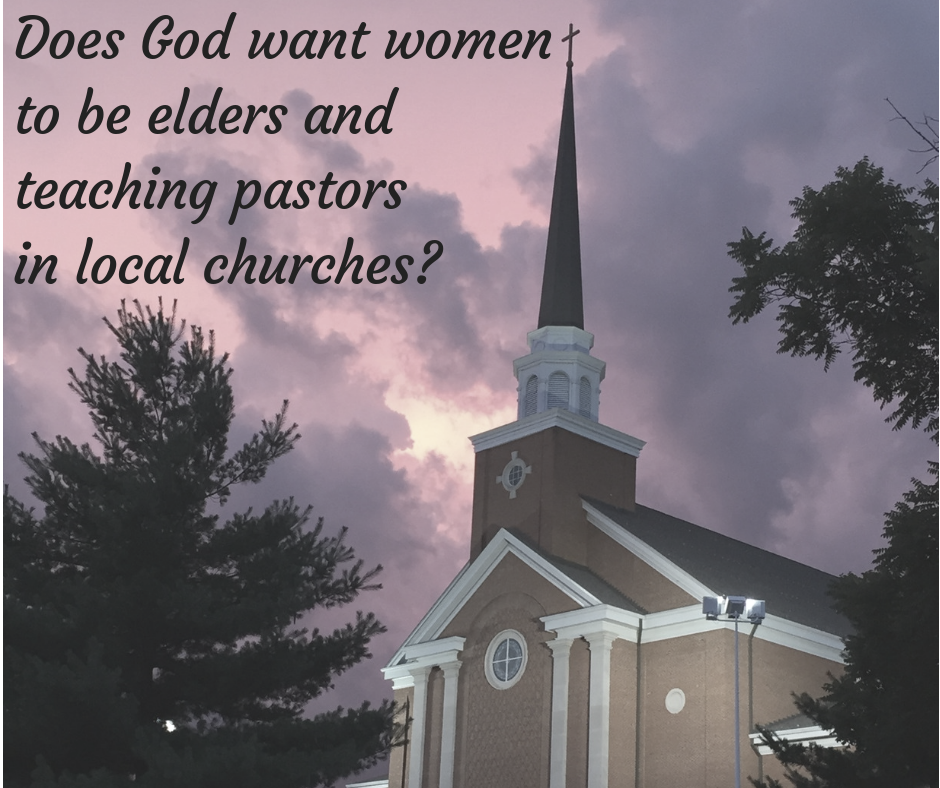Recently a friend pointed me to a blog (see here) at patheos.com. The blog is entitled, “Why Arguments Against Women in Ministry Aren’t Biblical.” The June 2, 2015, blog was written by leading NT scholar Ben Witherington. In this blog, Witherington argues that there is a bigger role for women in the local church than many conservative Evangelicals believe. I welcome the opportunity to interact on this issue.
I begin by recognizing that Witherington has done a lot of work on this question. This was the topic of his doctoral dissertation at University of Durham in England. It was also the subject of his first three books. I respect his scholarship, though I do not agree with his conclusions or his hermeneutics.
Witherington correctly notes that the NT knows nothing of “categories like ‘senior pastor’ or ‘pulpit minister.’” In fact, he could go further. The NT knows nothing of pastors of any kind, at least in terms of an office. The only pastors in the NT are elders in local churches who are to shepherd their local churches (cf. Acts 20:28; 1 Tim 5:17; Heb 13:17; 1 Pet 5:2).
Is it true, as Witherington claims, that “the NT has been used over and over again to justify the suppression of women in ministry”? I suppose it depends on what one means by “the suppression of women in ministry.”
In most Evangelical churches today, women can speak in church as long as they do not give “the sermon.” So a woman can lead singing and give little sermonettes before each song. A woman can lead in prayer, make announcements, appeal for money, read Scripture, put on a skit, etc. In my opinion that is all wrong. Paul said that women were to keep silent in church (1 Cor 14:34; 1 Tim 2:11). In fact, women are not even to ask questions in the public meeting, but are to ask their husbands at home (1 Cor 14:35).
Some leading Evangelical churches even have women elders, something specifically forbidden by Paul (1 Tim 2:12).
So, on the one hand, I think Witherington is off base. Women are not too suppressed in ministry today. I think they are not suppressed enough, at least in church.
On the other hand, I agree with Witherington that women are suppressed in ministry in ways that NT never envisioned. Can women teach men outside of the meeting of the local church? Absolutely. There is no reason why women could not teach at home Bible studies made up of men and women, at Bible college and seminary classes, at evangelistic rallies, at rescue missions, at conferences, and anywhere that is not the meeting of the local church.
I was an intern at First Baptist Dallas back in 1980. I worked under then high school pastor Robert Jeffress. Dr. W. A. Criswell was the legendary senior pastor. Mrs. Criswell led an adult Sunday School class made up of men and women at FBC that was broadcast on the radio. I don’t recall any controversy about her teaching in the church building or on radio.
However, around that same year I heard Elisabeth Elliot Gren speak in Chapel at Dallas Theological Seminary and was embarrassed by the actions of some of my fellow students. Dr. Walvoord, President of DTS, introduced her and said that she was speaking under the authority of the Board. When she began to speak, around 200 of the 800 men in the audience stood up and walked out. While she was speaking. I thought that was highly disrespectful. Only if Chapel at DTS were considered church would a woman be forbidden from speaking. I sat and listened and learned from her. I had no qualms of conscience. Chapel was not church.
I’d now like to briefly respond to the three Biblical arguments that Witherington makes in favor of women being able to do anything in ministry today which a man can do. Actually, he makes no arguments in favor of his position (which is telling). What he does is try to reject three arguments against his position.
His first argument: the idea that “women can’t be ministers, because only males can be priests offering the sacrifice of the Mass etc.” is unbiblical. He says “there are not priests in the NT.” Agreed. But unless one is Roman Catholic, Orthodox, Anglican, or Episcopalian, this is not a point being made. This is a straw man.
His second argument: the idea that “women can’t be ministers because then they would have headship over men, including their husbands— and this will never do, and is a violation of the household codes in the NT” is unbiblical. In the first place, women teaching men outside church is not forbidden in the NT. In the second place, while men are the heads of their homes, that in no way forbids women from teaching their husbands or other men as long as it is outside the church meeting. Witherington goes too far in my opinion when he suggests that “Paul and others are working hard to change the existing structures in a more Christian direction. Paul, for example, has to start with his audience where they are, and then persuade them to change.” In his view, Paul’s writings present a “trajectory” that is leading toward a man having less and less authority over his wife, children, or servants and that ultimately what Paul wanted, though never said, is that homes would be fully egalitarian.
I think the U.S. Constitution should be interpreted as written. So should the Bible.
His third argument: the idea that “Women can’t be Christian ministers because specific passages in the NT prohibit it” is incorrect because it is based on poor exegesis. He then gives a rather lengthy discussion of 1 Cor 14:33-36 and 1 Tim 2:8-15. He attempts to show that Paul did not mean what he wrote there. I do not find his arguments convincing. I urge you to read his blog to see for yourself.
Witherington ends his third argument with a discussion of the requirement that an elder be “the husband of one wife” (1 Tim 3:2). He rejects the notion that that means only men can be elders. Why? “This does not mean it needs always and forever to be that way, but the new converts would have to be convinced by loving persuasion that it was ok for women to fill such roles.” What he does there is reject what Paul wrote on the assumption, with no evidence to support his assumption, that Paul was merely setting some early rules for elders, but that he wanted elders to be men and women.
Based on the hermeneutics Witherington uses, it would seem that nothing in the NT needs to be taken as written. Using the same methodology as Witherington, some (though evidently not Witherington) believe that the trajectory in the NT is toward accepting homosexuality and homosexual marriage. Transgenderism? Bisexuality?
Here is another blog that responds to Witherington. Here is a book, edited by Piper and Grudem, that responds to Evangelical Feminism, the position of Witherington, and which has entire chapters on 1 Cor 14:33-36 (by Carson) and 1 Tim 2:11-15 (by Moo).
Some reading this probably think I am too conservative in my views. Others probably think I’m too liberal. My concern is not what others think, but what the Lord has said and how He will judge me at the Bema (James 3:1). I want to be faithful to what He has written. I want to please the Lord Jesus Christ.





